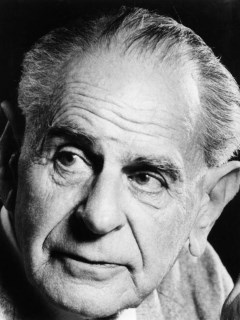
Publication details
Publisher: Springer
Place: Berlin
Year: 2002
Pages: 399-404
Series: Vienna Circle Institute Yearbook
ISBN (Hardback): 9789048159765
Full citation:
, "Karl Popper", in: History of philosophy of science, Berlin, Springer, 2002


Karl Popper
the formative years, 1902–1945; politics and philosophy in interwar vienna
pp. 399-404
in: Michael Heidelberger, Friedrich Stadler (eds), History of philosophy of science, Berlin, Springer, 2002Abstract
When Karl Popper's The Open Society and its Enemies 1 was published in 1945, shortly after the second World War had ended, his work soon became a classic for the defence and support of the western alliance against Soviet communism and Stalinism in the cold war. This interpretation primarily provided by authors of conservative liberalism emphasised Popper's criticism of the historicistic theories of Karl Marx as well as his new contributions for the defence of western democracy, to social philosophy and the philosophy of history. A different interpretation of Popper's work was provided in the early seventies of the 20th century by authors of social-democratic orientation and by those who belonged to progressive liberalism.2 After having discarded Marxist thought as a theoretical foundation of practical politics, some social democratic and progressive liberal thinkers looked for new theoretical foundations that could serve as new guidelines for policy measures. In actual politics Marxist ideas as guidelines for policy measures had long been substituted by reform policies, and a new theoretical and philosophical foundation was required in order to solve the discrepancy between the theoretical basis and policy measures. Popper's ideas with respect to the social welfare state, western democratic institutions, liberalism, policy measures and the methods of social science seemed to provide such a new theoretical foundation. Some authors even thought that Popper's philosophy of Critical Rationalism ought to be regarded as revival of the so-called Bernstein tradition in (German) social democracy. However, although it seems that some ideas of Critical Rationalism indeed became a kind of theoretical guideline for social democratic policy measures, Critical Rationalism rather was regarded as a support of conservative liberalism and particularly in the late 70ies and 80ies as a kind illegitimate offspring of Hayekianism. Given this spectrum of possible interpretations of Popper's ideas it is not surprising that politicians from the conservative right to the progressive left all quote parts of Popper's work in order to support their positions.
Cited authors
Publication details
Publisher: Springer
Place: Berlin
Year: 2002
Pages: 399-404
Series: Vienna Circle Institute Yearbook
ISBN (Hardback): 9789048159765
Full citation:
, "Karl Popper", in: History of philosophy of science, Berlin, Springer, 2002


